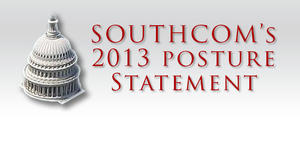On March 19, General John Kelly made a statement before the Senate Armed Services Committee in which he outlined the posture of the US military toward Latin America. General Kelly is the Commander of the U.S. Marine Corps' U.S. Southern Command (SOUTHCOM) that seeks to coordinate U.S. security interests in Central and South America, as well as the Caribbean. In this blog I will highlight the elements of his statement that relate to Colombia and the U.S. military perspective on the peace process and their long-standing position against the FARC.
It is important to keep in mind that the United States' role in Colombia, and in most of the region, started in earnest with the declining hegemonic power of the old colonial states in the early 19th century. The infamous Monroe Doctrine of 1823 was the Manifest Destiny of an emerging imperialist power that soon eclipsed the old colonial order by creating its own. In Colombia, U.S. interventionism dates back to that period and was decisive in the dismembering of Gran Colombia and then Colombia, which included Panama until its secession in 1903. In more recent times, the United States cultivated special links with Colombia’s military, grooming it to play an important part of its regional and global security strategy thanks to over $7 billion and counting that the United States invested between 2002 and 2012 in hardware, indoctrination, and training under the so called Plan Colombia.

Against such a painfully brief background, we can better understand and evaluate what General Kelly presented. He described Colombia prior to Plan Colombia as “perhaps the best example of the inherent value of security assistance in the region.” He added, “ Once on the brink of falling to a powerful insurgency, Colombia is now a leader[emphasis added] in counterinsurgency tactics and now provides training to West African and Central American counterparts.” Of course, Kelly wanted to sell the idea to the Senators that security assistance is paying off and that Colombia is a case in point of a success of the U.S. policy.
But there are some elements in Kelly’s presentation that are troubling and which could undermine the peace process. Considering that some of his assessment of the nature of the regional threats, including that of the FARC, is motivated by the vested interests of SOUTHCOM as well as of those of the Pentagon in order to avoid painful budgetary cuts during an economic crisis. But his assessments also affect the peace process and the incentive structure of the Colombian government, but more importantly, it his assessment could also influence the Colombian military establishment and other enemies of peace. The Colombian military, seemingly “benevolent” in regional terms, was capable of sabotaging previous attempts at peace in 1984 and 1998 with the help of the landed elite and the United States.
Kelly confirmed that the FARC has acquired surface-to air missiles, which had been reported before, and that the FARC has small submersible vessels capable of reaching the U.S. coastlines in Florida, Texas, or California in a span of 10 to 12 days and with a range of 6,800 nautical miles, i.e. capable of reaching Africa. Regarding the surface-to air missiles, Kelly did not specify what type. But some time ago it was reported that the Colombian military captured two Sam 7 from the FARC in the department of Cauca. Sam 7 is an old missile but capable in neutralizing the strategic advantages that the Colombian state has gained in the last 10 years.

The FARC acquisition of the missiles introduces a new variable to the dynamics of the Colombian war system, re-equilibrating its balance of power similar to that achieved by the FMLN in El Salvador during the last two years of its civil war. FMLN's access to these missiles neutralized the state’s air power and accelerated the termination of the conflict. But Kelly did not have high expectation of the Colombian peace process; instead he expressed skepticism. He contextualized the FARC’s missile acquisition with the continuation of the war rather than a speedy conclusion. Regarding the submersible, Kelly said that these are used to transport drugs. But given the U.S. security paradigm of the “War on Terror” in which FARC forms part, one can plausibly think that if it can carry 10 metric tons of cocaine then it could possibly be used to transport explosives, which may be of lesser weight.
Finally, Kelly underscored the activities and operations that SOUTHCOM is carrying out jointly with the Colombian military in targeting the FARC areas of concentration and leadership. But what is also worth mentioning that the SOUTHCOM even sponsored a seminar to “Counter FARC Ideological Activities” in partnership with academia in its attempt to “build intellectual capital.”
In conclusion, this report showed no critical reflection on the past U.S. policy toward the region or toward Colombia. What it does instead is to encourage the continuation of the conflict-promoting policing—the imperial remedy since Monroe.
General Kelly, please give peace a chance!
Stay tuned
Nazih Richani is the Director of Latin American studies at Kean University. He blogs at nacla.org/blog/cuadernos-colombianos.

